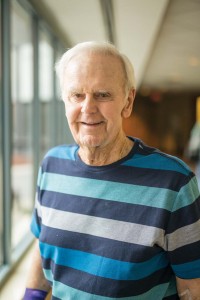On Course
June 15, 2015

Photo by Daniel Dubois
A bricklayer by trade and a passionate golfer—including seven holes in one and a membership in the Indiana Golf Hall of Fame—Gerald Schreiber has spent his life in the sun. But all that time outside may have caused melanoma, the most deadly form of skin cancer.
Schreiber was first diagnosed in 2003 after he noticed a spot on his eyelid. He was successfully treated at the University of Texas MD Anderson Cancer Center and was in remission for several years. But the cancer came roaring back in 2013 and had spread to his liver and both lungs.
Schreiber and his wife, Phyllis, split their time between Florida and Evansville, Indiana, and wanted to find a doctor closer to home for his second round of treatment. At Vanderbilt-Ingram Cancer Center, Igor Puzanov, M.D., MSCI, associate professor of Medicine and director of Melanoma Clinical Research, offered a clinical trial for a new immunotherapy drug.
“Dr. Puzanov called me and said, ‘This is the only chance you have.’ I wanted to live, and it seemed to be working for a lot of people. I had no worries about being in a clinical trial. If it could help me live longer, I wanted it,” Schreiber said.
Immunotherapy is an expanding field in cancer therapy that stimulates the body’s own immune system to destroy cancer cells. Schreiber tried a new drug called pembrolizumab, which blocks a receptor called PD-1 and activates immune cells to attack tumors.
Schreiber started the drug in February 2014 and has infusions every three weeks. The Food and Drug Administration approved pembrolizumab, manufactured as Keytruda by Merck, in September 2014.
Pembrolizumab has been shown to cause more than 30 percent shrinkage of tumors in approximately 30 percent of patients on therapy, Puzanov said.
“Moreover, these responses are durable, lasting more than 24 months and in many cases ongoing. The same drug and others in its class are showing promise in multiple tumor types including mesothelioma, glioblastoma, small cell lung cancer and others, in the trials conducted at Vanderbilt-Ingram and elsewhere. The next step requires understanding why some patients do not respond, and what to do for them to help their immune system,” Puzanov said.
Through the immunotherapy, Schreiber’s tumors have shrunk 50 percent.
“I think that if I hadn’t started that drug I wouldn’t be here today,” he said. “I’ve been around long enough now I think maybe I could be one of the ones who lives a couple more years.”
Best of all, he was able to get back on the golf course this winter.
“I can play 18 holes, but then I’m ready to go to bed,” he said with a laugh.
Last summer, he and Phyllis organized the Melanoma Golf Classic at Evansville Country Club and donated $19,000 in proceeds to Vanderbilt-Ingram. The second annual event will be held July 27.
“I’m happy I’m helping others and grateful for the ones who did it before me,” Schreiber said.
– Leslie Hill
